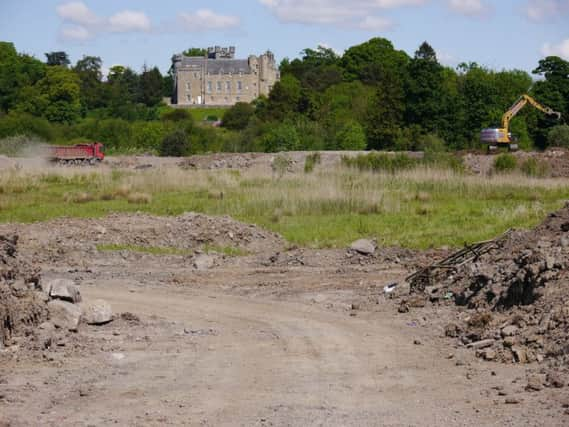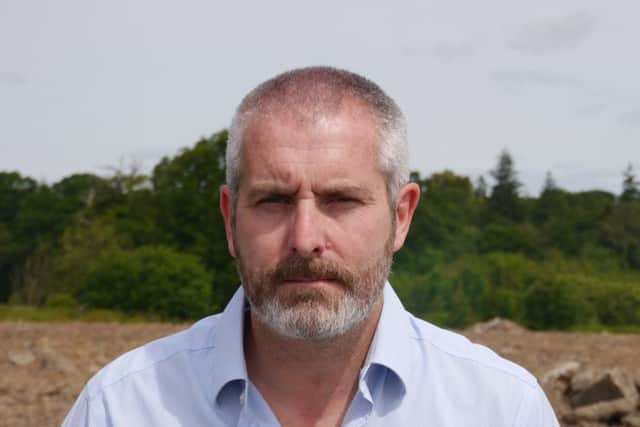Watchdog slams Falkirk Council over toxic waste dump


Falkirk Council gave the go-ahead for waste soil and stone to be imported to the site at Waterslap Farm, near historical Airth Castle, which had previously been mined for coal.
It is estimated 180,000 tonnes of waste has already been tipped onto the land in Stirlingshire.
Advertisement
Hide AdAdvertisement
Hide AdNeighbours to the site are furious and have significant concerns over the impact of the unregulated dumping, which could contain toxic substances such as asbestos and has already caused flooding.


The scheme was deemed “permitted development” under the General Permitted Development (Scotland) Order, allowing soil to be brought in to restore industrial land for agricultural use.
The local community was not consulted because no planning permission was required.
But a probe by the Scottish Public Services Ombudsman has ruled Falkirk Council committed a catalogue of errors in its handling of the case.
The watchdog found the authority had wrongly classed the scheme as permitted development and a planning application should have been submitted, advising retrospective consent should be sought.
A licence for waste disposal was wrongly granted and environmental controls were not put in place due to Falkirk Council’s mistake.
Council officials and the developer all failed to consider the flood implications despite the availability of significant information advising this would be necessary.
Local businessman Stephen Sloper has lived near Waterslap for the past 30 years.
Advertisement
Hide AdAdvertisement
Hide Ad“The matter has caused countless sleepless nights and a lot of stress,” he said.
“We have been fobbed off, ignored and arrogantly told we were wrong and that Falkirk Council officials knew better.”
Sloper and other family members have their homes at Airth Castle estate and must cross a 300-year-old bridge over the Pow burn to reach them.
The route is used daily by visitors to Airth Castle hotel and children attending the local primary school.
Since the dumping operations started, there has been a corresponding rise in the frequency and severity of floods.
Sloper said: “The immediate impact of this development on us means three generations of my family, aged from three to 73, cannot access their own homes and get to and from work or school at certain times due to being cut off by floodwater.
“We live in fear that fire crews or ambulances would be unable to reach us if there was an emergency during a flood.
“The general public are also put at risk. Children use this road daily to get to school and could be in danger if they tried to cross deep flood water.
Advertisement
Hide AdAdvertisement
Hide Ad“The longer-term effects are uncertain as there is no way of knowing the effects of the unapproved materials additionally deposited within Waterslap.”
Falkirk Council said it has been attempting to resolve issues at the former open-cast site for a long time following the operator going into liquidation.
A spokesman said: “The works undertaken to restore the site were demonstrated to us as being agricultural in nature and as such were considered not to involve the need for planning permission. The works have been completed and the site has been restored.
“Following subsequent detailed legal opinion that was sought on this complex case, it was noted that the works should indeed have required planning permission.
“The council considered carefully whether enforcement action is necessary. This would involve retrospective submission of an application for planning permission, seeking return of the site to levels and a condition that, due to lack of adequate information and the passage of time, it is no longer possible to determine.
“We do not consider that this exercise would be successful or in the public interest and therefore, after careful consideration, have determined not to take further action.”
A Scottish Environment Protection Agency (SEPA) spokesperson said: “Every day SEPA works to protect and enhance Scotland’s environment, including Airth. SEPA authorised, under exemption, the acceptance of construction materials to restore land for agricultural benefit at the former open-cast mine site at Waterslap, Airth.
“This activity has now concluded. Our officers have undertaken numerous inspections at Waterslap Farm and are satisfied that the activity complies with the registered exemption.”